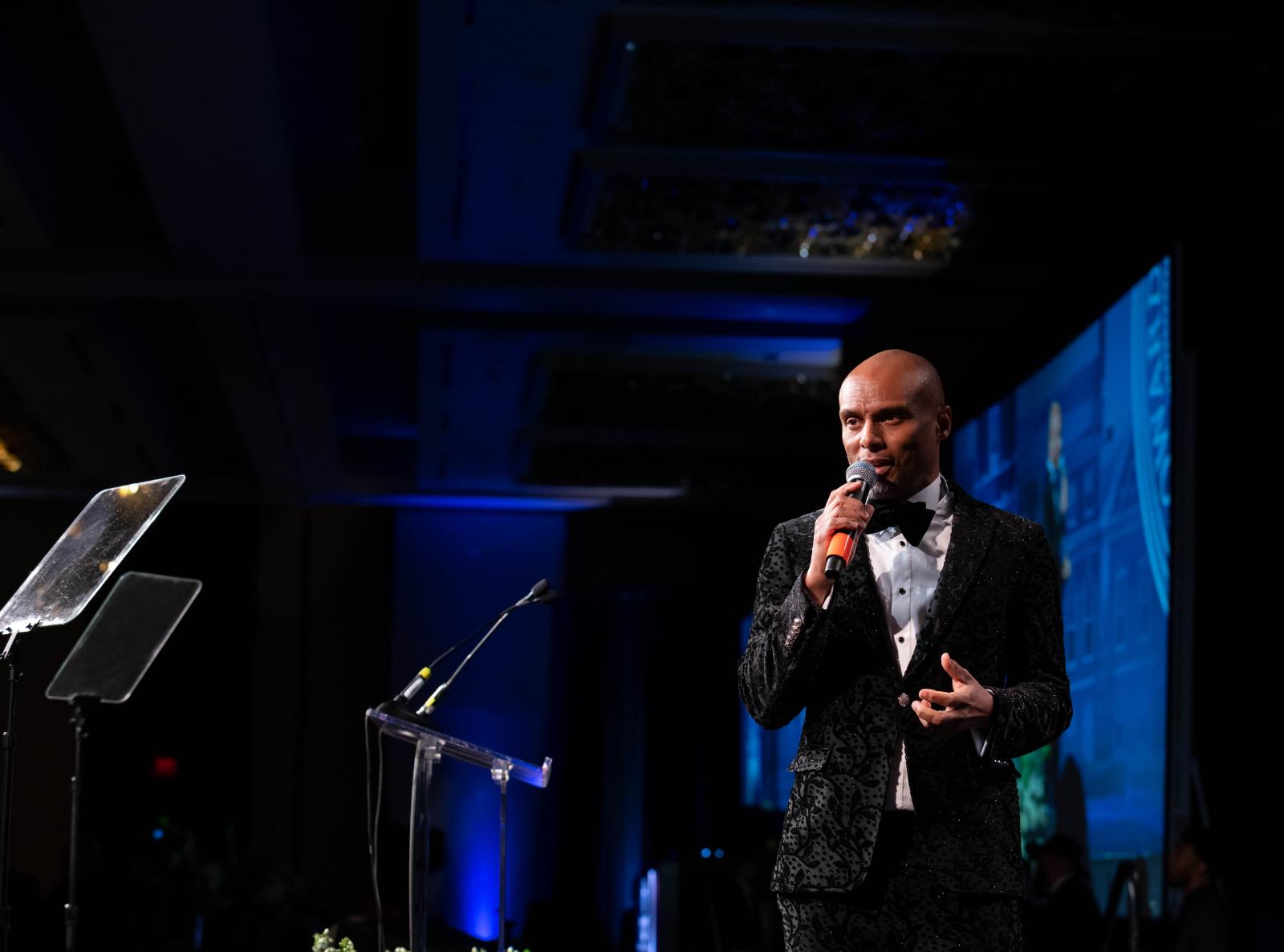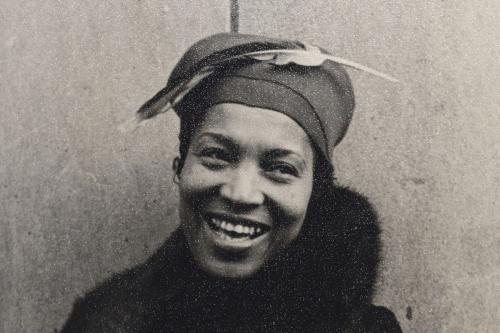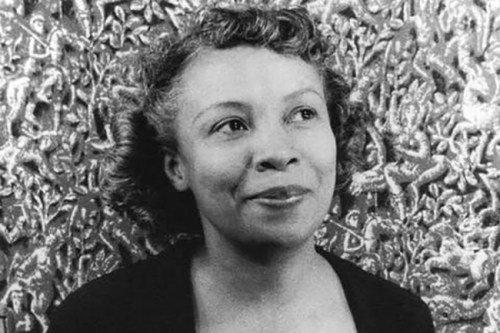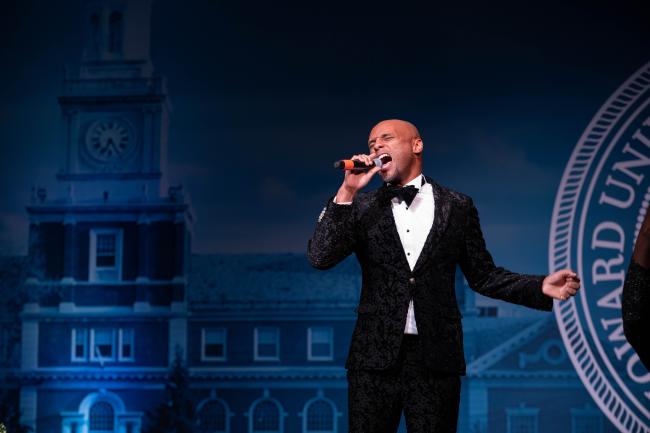We close out Black Music Month with a singer whose longevity in the music business is a true testament to a talented artist understanding the power of legacy and community, taking the advice of and learning from those who’ve come before him, and constantly perfecting his craft and technique: DMV native and Howard alumnus Kenny Lattimore.
“It’s not always about how talented you are. It’s about the technique that allows you [to be]. This is what Deniece Williams told me at Howard — technique allows you to do that same thing over and over and over again. Whereas your talent could allow you to do it that one time …” – Kenny Lattimore
A Love of ‘Song’
“If it’s something that burns deep inside of you, find some outlet to express yourself in your creativity,” Lattimore advises. Before rising to fame in the mid-1990s with hits like “For You” and “Never Too Busy” off his 1996 eponymous debut album, the singer started out doing just that, performing anywhere from the pulpit to the political arena. “I was singing in church. I would sing for the mayor. I would sing for the Rainbow Push Coalition — whatever came about that allowed me to do what I loved.”
It was while performing with local bands throughout the city that the then-Howard University freshman was discovered and signed to a record deal. “A group called Maniquin spotted me at a wedding, of all things, and asked me about joining the group,” said Lattimore. “They already had a record deal with Polydor, but it was what they called an exploratory or a spec deal,” he explained, noting that once he came onboard, the group’s sound and style evolved, with Maniquin eventually landing at Epic Records.
Kenny Lattimore's 1996 hit, "For You" off his self-titled debut album.
The Path to Howard
Given his origin story, it might be surprising to learn that the R&B singer’s journey as a Howard student didn’t begin in the College of Fine Arts (he was an architecture and planning major), nor did he initially plan to attend the University. Growing up in the Maryland suburbs just outside of D.C., Lattimore thought he’d perhaps attend a college in-state. His mother, however, wanted him to have the HBCU experience — at her HBCU.
“I’m legacy,” began Lattimore. “My mom attended Howard, got her master’s from Howard and I grew up on the campus, pretty much. She had an apartment at Fairmont Street right across the street, you know? And so, my earliest memories of life were walking the campus of Howard University.”
Calling his eventual attendance a natural progression that felt like returning home, he notes his mother’s intention for him to attend a university of excellence, surrounded by those who look like him.
“Coming from the suburbs of Maryland and being surrounded by folks other than myself, culturally, she wanted to make sure that I was grounded in who I was; that I saw myself in excellence, and that I saw others from the diaspora that were Black in excellence,” he said. “That was, I think, my mother’s plan [for me] as an educator and visionary.”
While Howard shaped him as an artist and as a person, Lattimore said his experience was amazing yet complicated. “I got a chance to study with LeRoy Dorsey, who had taught Donny Hathaway, Roberta Flack, and Angela Winbush. I got a chance to work with James Holliday. All my vocal instructors taught me something completely different,” he said.
What Lattimore describes is a dream come true. At the same time, he was dealing with a nightmare: his mother’s rare cancer diagnosis.
“The other twist to this whole story is that my amazing visionary mom was dying at the same time, and she was working at Howard,” he continued, noting her position with the University was the first where she was able to do what she really wanted. “It was like her dream job; she was working at the Center for Academic Reinforcement, helping students to be their best and stay in school.”
Through it all, she was dealing with multiple myeloma, a type of blood cancer that develops in plasma cells in bone marrow. “It was a really different kind of thing. Nobody knew that much about it then; now it’s a little more common,” said Lattimore, who would balance schoolwork with multiple jobs, perform with his band, and help his “bonus dad” take care of his mother.
Understandably, these responsibilities and his new reality eventually made it difficult for him to attend classes. “All of that led to me not going back,” he said. “After a while, it was very difficult to even walk the campus. I actually don’t think I walked the campus until 1996, when I went back as a recording artist — Chaka Khan and I had a homecoming gig or something there,” he said. “That made it a little more complicated for me.”
“I wanted to be like the great singers. I didn’t want to just be good or just have commercial success and a couple of hit records — I wanted to be considered one of the great singers amongst my peers in the industry. A lot of that came from that master class at Howard.”
A ‘Mecca’ Impact
Despite the complications and heartbreak, Lattimore recalls his time at the Mecca fondly, sharing the impact that the University community made on him.
“One of the most precious things about being at a HBCU was the staff,” he said. “The people that I felt really cared about me and wanted me to succeed and win.” When it came to his classmates and the coursework, the singer said he had to speak to the differences between his two majors.
“Architecture and Planning was no joke, as the engineering and architecture students would probably tell you;” said Lattimore, noting with affection the sacrifice those courses demanded. “We would spend nights sleeping on those table drawing and all of that. We were not at the party, okay?” he laughed. “But my other flip side is, when I did get over to Fine Arts, it just so happened to be a time where Deniece Williams — the amazing Grammy award-winning singer — was giving master classes about the entertainment industry. This is what changed my life.”
During the class, Williams brought in experts from various aspects of the industry — from the stage to the business side. “There were engineers and producers and commercial singers … to let us know that the music industry was bigger than just being an artist on stage,” he said. “It impacted my life so much that I still have my notes.”
The singer also kept note of his goals from this time in his life. “I had different goals that I set out from that particular time period,” he said. “I achieved every single one of them, including recording for the same label as Deniece Williams.”

Lattimore’s studies outside of the classroom came in the form of listening to and learning from the likes of Luther Vandross, Darryl Tookes, and Patti Austin, whom he noted could change up their voices, but at the same time be what he called “amazing session singers,” accomplished musicians who could “read music” and “have a great ear.”
“Those were the kind of singers that I pursued after,” he said. “I wanted to be like the great singers. I didn’t want to just be good or just have commercial success and a couple of hit records — I wanted to be considered one of the great singers amongst my peers in the industry. A lot of that came from that master class at Howard.”
The HBCU Legacy Continues
Kenny Lattimore Jr. graduated from another HBCU this past May, Lincoln University, which his father called “sort of a legacy, too,” as his mother also worked at the university.
“It was her first job in her field, and so I was able to be on that campus for three years — from first grade to third grade,” he said. “My son going back to this little town and achieving his degree, there was a lot of sentimental value there.”
Of course, though proud of his son for “finding his place” at Lincoln, undoubtedly rich in its own legacy, Lattimore hoped Jr. would eventually follow in his footsteps. “I thought my son was going to go to Lincoln for about a semester or two, and then he was going to go to Howard. I really did!” he said. “I was like, ‘Come on, son! Come on to the Mecca!’”
Black Music Month & Today’s Music Scene
“We are the culture makers and music changers; we set the trends. As a result, I think that it’s so important that we get celebrated,” said Lattimore. “We’re going to come up with the next sound because we always have — from country to rock, to hip hop to underground, and soul — all these different things have come from us that the world celebrates. So, they should be celebrating the creators of this music as well.”
As one of those trendsetters, breaking out during what is often called the golden era of R&B and continuing to tour and record today, Lattimore has seen the industry’s evolution. One significant change he’s witnessed? That today’s stars almost make themselves.
“I come from a time in the industry where stars were made, and a lot of people don’t like talking about it, but stars were made, meaning they were chosen,” he said. He explained that record labels would often choose artists worthy of their investment. Though he admits the old formula still exists, the pathway has been changed by technology, and mostly for the better. “Now with technology, we have this opportunity to get more exposure independently, and we don’t have to depend on record labels,” he said.
Advice for the Next Generation
When offering advice to those just starting out in their careers, Lattimore stresses the individual journey and notes the importance of authenticity. “Remember that everybody has a different path,” he said.
When it comes to artistry, “Study the art. Spec it,” he said, noting the downside of technology is the overexposure it brings. “Information is thrown at us at alarming rates; we cannot always value the art itself. I think that a lot of times, we get to the point where we want things instantaneously, and we don’t respect the journey and the study of it.” This has played a part in his longevity according to Lattimore, alongside it “being the plan of God.”
While there may be no set formula to success, one can look to the decades-long career of Lattimore as a blueprint for what studying the greats and consistently honing and revering your craft — while always being prepared for an opportunity — can bring.
“Respect and study it, because you never know when it’s going to come,” said Lattimore. “It’s always better to be ready than to have to get ready.”
Keep Reading
-
 Vanguard: Arts and Culture
Vanguard: Arts and CultureHoward Spanish Majors Are Ready for a Bad Bunny Super Bowl
Feb 6, 2026 4 minutes -
 Change Makers
Change MakersThe Life and Legacy of Zora Neale Hurston: ‘A Genius of the South’
Jan 8, 2026 6 minutes -
 News
NewsThe Librarian Who Built the Home for Black Writing, and Other Alumni Who Have Changed Literature
Feb 23, 2026 6 minutes
Find More Stories Like This
Are You a Member of the Media?
Our public relations team can connect you with faculty experts and answer questions about Howard University news and events.
Submit a Media Inquiry

